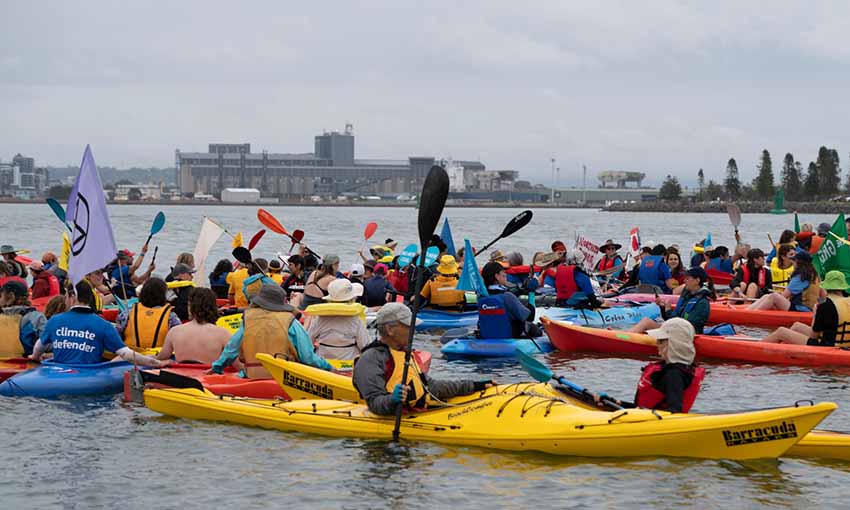THE NEW South Wales Supreme Court has today (7 November) ruled in favour of an application by the NSW Police Commissioner to prohibit a planned climate protest in Newcastle’s Harbour scheduled for later this month.
The protest in question was organised by climate activist group Rising Tide, and would involve activists utilising kayaks and other rafts to attempt to blockade the Newcastle Harbour and halt coal exports leaving the port for up to 30 hours.
The NSW Police challenged the protest event, entitled “The People’s Blockade of the world’s largest coal port”, citing the safety of participants, stating that an agreed position between the two parties was not able to be reached.
Justice Desmond Fagan reportedly agreed with the position of the police commissioner, commenting, “During a four-day assembly involving about 5,000 people, at times, some may engage in group behaviour that threatens to become unmanageable”.
“A 30-hour interruption to the operations of a busy port is an imposition on the lawful activities of others that goes far beyond what the people affected should be expected to tolerate in order to facilitate public expression of protest and opinion,” Justice Fagan said.
In issuing the prohibition order Justice Fagan reportedly also remarked it was “highly likely, to the point of near certainty” that those engaged in the protest would stay beyond the agreed deadline of the events conclusion.
The court was reportedly told that an estimate of between 24 to 30 bulk carriers would be blocked from entering the port during the protest period.
Despite the ruling, Rising Tide released a statement on Facebook today assuring that the protest would go ahead, asserting the ruling “does not mean that the People’s Blockade is ‘prohibited’ or ‘unlawful’”.
The group said the Police Commissioner’s orders, which have been upheld by the Supreme Court, in Judge Fagan’s words “would not of themselves render unlawful the conduct of either the assembly on land or the use of light craft in the channel”.
In NSW, organisers of a protest must submit a notice of intention to hold a public assembly to the police commissioner, known as a Form 1. Without this form, a protest is not considered lawful.
Despite asserting the “protestival” would go ahead, Rising Tide admitted the organisers were “carefully reading his honour’s judgement to plan our next steps”.
NSW Police released its own statement on the court ruling, commenting “The Supreme Court today has validated the NSW Police Force’s concerns about the safety of the assembly, by prohibiting both the water and land component of the public assembly”.
“The NSWPF acknowledges the right to free speech and political demonstration and in the vast majority of cases when a Form 1 is submitted, the NSWPF is able to negotiate a public assembly that does not compromise the safety of the participants, community and police.”
Rising Tide’s People’s Blockade was described by organisers as a “protestival”, which was set to feature performances from some of the biggest names in Australian music, including Peter Garrett, Angie McMahon, and John Butler.
NSW assistant police commissioner Dave Waddell had described “significant dangers” associated with the water activities planned for the protest, citing a similar protest in 2020 in which a number of protesters were swept towards the Newcastle’s Stockton breakwall after the tide and wind changed.
NSW Police concluded their statement by saying, “For their own safety and that of the other users of the Port, we request that people who still attend this event refrain from entering the harbour on kayaks or other vessels with the intention to obstruct other users of the Port, or engage in other forms of civil disobedience. We also encourage all participants to follow the directions of police”.

